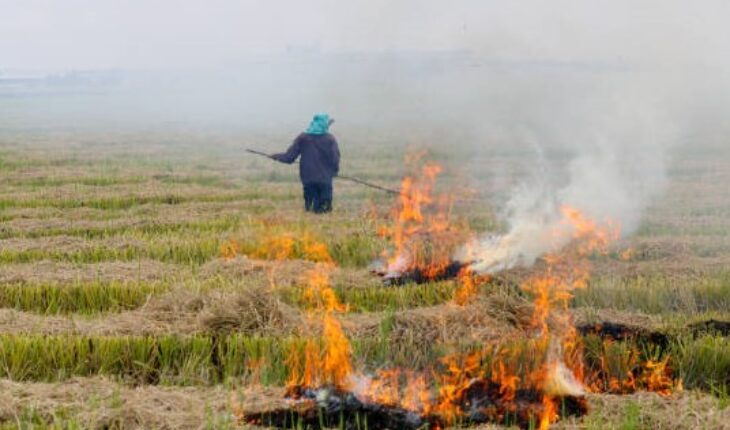Increasing cases of burning paddy crop wastes in the open in the agriculture fields in Haryana has started deteriorating air due to pollution before winter not only in the state, but also in NCR area and Capital Delhi. Despite all the restrictions as per law by the government, stubble is being burnt openly. The Air Quality Index (AQI) in many cities across the state has reached 225 which include the highest recorded as 225 recorded at Bahadurgarh with a light layer of smog also visible in the morning in some places. According to the Pollution Control Board, there are four stages of AQI, such as in case AQI is identified between 201 to 300 it is bad, if it come between 301 to 400 it comes in the category of very bad, in case AQI arrives in the third stage between 401 to 450 it is identified as serious, whereas the fourth stage of AQI above 450 is very serious.
A couple of days ago Dr Ankur Tewari, Additional Director Pollution Control Board arrived at Hisar and visited a few sights along with the staff of State Agriculture Board where stubble burning complaints were received and discussed with the experts of Haryana Agriculture University. Information reveals, maximum complaints of stubble burning complaints in Haryana state have been received in Kurukshetra, Karnal, Kaithal,Yamunanagar, Ambala and Sonipat districts. According to available data, with effect from 15th September to 17th October this year nearly 575 stubble burning complaints have been received so far as against 340 complaints received in 2023, 83 complaints received in 2022 and 247 complaints received during 2021.
The detail of stubble burning complaints received so far from different districts in the state identified as 575 cases include 40 in Sonepat, 86 in Kurukshetra, 66 in Ambala, 55 in Karnal, 97 in Kaithal, 47 in Jind, 40 in Sonepat, 32 in Fatehabad, 25 in Panipat, 23 in Yamunanagar, 27 in Faridabad, 26 in Palwal, 16 in Hisar, 14 each in Panchkula and Sirsa, 6 in Rohtak and 1 in Jhajjar. Haryana state agriculture department has conducted a large number of raids on getting stubble burning complaints in the state in the past about three weeks. Amount worth Rs 90 thousand was imposed towards fine on getting 83 stubble burning complaints in Kaithal district. As against 11 stubble burning complaints received from Yamunanagar Rs 27,500 fine was imposed on the farmers. Similarly, as against 51 stubble burning complaints received in Ambala district, a fine for amount worth Rs 60,000 has been recovered from the farmers and amount worth Rs 1,20,000 towards fine recovered against 45 complaints received in Kurukshetra district so far. An FIR has been registered with the police against a farmer in Radaur when caught while burning paddy crop remains in open in his field. State has also registered five FIRs, 30 red entries in land records and environmental compensation worth Rs 1.50 lakh imposed in stubble burning cases.
Information reveals that of the 129 cases reported till September 30, action was taken in 87 cases as per the official data released by the state government, which include includes five FIRs registered under section 223 (disobedience to order duly promulgated by public servant) of Bharatiya Nyaya Sanhita, the environmental compensation worth Rs 1.50 lakh has been slapped in 52 cases and as many as 30 red entries in the revenue records of the farmers have been made for violating the directions of complete ban of burning crop residue.
Information by the Punjab Pollution Control Board (PPCB) reveals that the field staff visited 112 sites personally and initiated action according to the report. One of the PPCB officials, requesting anonymity, said they have clear-cut instructions from the state government to adopt all possible stringent measures to minimise cases of farm fires during the current year after the Supreme Court and National Green Tribunal (NGT) strict instructions to stop farm fires. Every year, the northern region, especially Delhi and its surrounding areas faces a public health crisis in the run-up to and during most of the winter season. The crisis began with the farm fires in Punjab, Haryana, and Uttar Pradesh, where farmers set fire to hundreds of square kilometres of paddy fields after harvesting them to clear them of residue, thus posing severe health and environmental risks.
Dr Wazir Singh Deputy Director in Agriculture Department said that Supreme Court of India has taken a serious view as regard burning stubble in open in the agriculture fields, as such Haryana state government has declared as many as 20 farmers in Red Entry from whom crops will not be purchased by the government agencies on minimum support price, besides such farmers will be deprived of all facilities available under ‘Meri Fasal Mera Biyora’ scheme by the Haryana state government.






